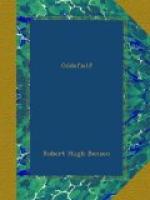The cry was raised presently to clear the House; and we went away; for their Lordships were to record their votes; and we had not stood half an hour in the court outside, before there came a great cheering and shouting; followed hard by a great booing from the crowds that stood packed outside. My Lords had thrown out the Exclusion Bill by above two-thirds of their number—which was ninety-three. Presently His Majesty came out by his private way, laughing and jesting aloud with two or three others.
It was to be expected that the country-party would make some retort to this; and what that retort was I heard a few days later, from a couple of gentlemen who came into the parlour at the Covent Garden tavern where I was taking my supper. They came in very eagerly, talking together, and when they had sat down, one of them turned to me.
“You have heard the news, sir?”
“No, sir. What news?”
“My Lord Stafford is to be tried for his life.”
I did not know what political complexion these two were of; so I looked wise and inquired how that was known.
“A clerk that is in the House of Lords told me, sir. I have always found his information to be correct.”
This was all very well for the clerk’s friend, thought I; but not enough for me; and so soon as I had finished my supper and bidden them good-night I was off to Mr. Chiffinch.
“Why yes,” he said. “It is like to be true enough. I had heard talk of it, but no more. It is he whom they have chosen as the weakest of the Five in the Tower; and if they can prevail against him they will proceed against the rest, I suppose. I wonder who the informers will be.”
I inquired how it was that the Peers did not resist.
“They fear for themselves and their places,” said Mr. Chiffinch. “They will yield up anything but that, if a man or two will but push them hard enough. And, if they try my Lord, they will certainly condemn him. There is no question of that. To acquit him would cause a yet greater uproar than to refuse to hear the case at all.”
“And His Majesty?”
Mr. Chiffinch eyed me gravely.
“His Majesty will never prefer his private feelings before the public utility.”
“And this is to the public utility?”
“Why yes; or the country-party thinks it is. It is the best answer they can make to their rebuff on the matter of the Exclusion Bill.”
The rumour proved to be perfectly true. The Five Lords who were still in the Tower, had been sent there, it may be remembered, above two years ago, on account of their religion, although the pretended plot professed by Oates was of course alleged against them. Since that time Parliament had been busy with other matters; but such an opportunity was now too good to be lost, of striking against the court-party, and, at the same time, of feeding the excitement and fanaticism of their own.




